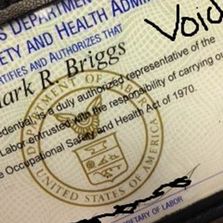
Is the OSHA Officer Real? Here's How To Spot the Scammers
Scammers impersonating Occupational Safety & Health Association Compliance Safety & Health Officers, otherwise known as “OSHA CoSHOs”, is a pesky and pricey hoax that never seems to go away despite the relative ease involved in identifying the fake OSHA CoSHO. This article will review some common and notorious scams, how to spot a fake CoSHO, and what to do if a scammer is suspected of posing as an OSHA CoSHO.
The Inspector Is A Fake. Now What?
If someone purporting to be an OSHA CoSHO is suspected of being a scammer, you should:
- Call the local police immediately
- Contact the State or Federal Bureau of Investigation
- If you haven’t already, contact your local area OSHA office
- If possible, get photographs of the suspected scammer
- Get photographs of the suspected scammer’s vehicle, including the license plate number.
Above all else, be careful. Impersonating a state or federal official is a big-time crime and a scammer will likely not go down easily and calmly.
Industrial Safety and Health Associates
Our seasoned safety consultants are experienced in OSHA compliance inspections, OSHA compliance programs, OSHA compliance training, risk management, and minimizing workers’ compensation premiums. Our team at Industrial Safety and Health Associates entered the field of safety consulting because we are passionate about preventing injuries, reducing workers' compensation costs and above all, it is our core value in our lives. We make a difference in the lives of people every day, from avoiding incidents to making their workplaces more successful. Contact us today!

The Scams
Can you identify the red flags in the following four sample OSHA scams? .
- The most common scam involving fake CoSHOs is the Poster Scam, which is provided free of charge ith this particular scam, fake CoSHOs typically call a business and tells them they need to purchase and post the OSHA “It’s the Law” Poster or the business would be fined. Variations of the scam include threats, if the business does not want to pay for the poster, of a full OSHA inspection or threats of closing the business down.
- Another popular scam involves a fake CoSHO that shows up and shows some sort of identification, and immediately begins the inspection. One or more violations are pointed out to business officials and one or more citations are written that require immediate payment of fines. If the business isn’t able to pay the amount of the fines immediately, the fake CoSHO negotiates an amount of fine that the business is able to pay on the spot.
- Another fake CoSHO offered training classes, to clear up OSHA violations they said they found on job sites. .
- Following the Deepwater Horizon oil spill, a a fake CoSHO represented themselves as a high-ranking OSHA hazardous waste safety instructor and inspector. They promised residents in the small fishing communities that lucrative employment opportunities were available for cleaning up the oil spill –provided they were properly trained. However, the woman had no connections with OSHA or the oil spill cleanup effort, and she did not have any training whatsoever in hazardous waste safety. The woman eventually plead guilty to criminal charges that landed her in prison for 57 months.

How to Spot the Fake CoSHO's
Red Flag 1: The fake CoSHO will not show an ID or will show a bogus ID.
Upon appearing at a place of business or job site, the real CoSHO should always immediately display his or her credentials
Red Flag 2: The fake CoSHO will not hold formal opening/closing conferences with the employer.
OSHA CoSHOs always (or at least attempt to) hold opening and closing conferences with the employer. The opening conference, although brief, covers why OSHA is at the workplace and the scope of the inspection
Red Flag 3: The fake CoSHO won’t be agreeable with a call to the OSHA Area Office to confirm their identity.
OSHA CoSHOs will always support the employer’s desire to confirm the CoSHO’s identity. Never use a phone number a CoSHO (real or fake) provides as a number to call to confirm their identity –it could be a phone number to an accomplice scammer. Always look up the number to the closest OSHA Area Office yourself.
Red Flag 4: The fake CoSHO will issue citations.
OSHA CoSHOs never issue citations; they merely collect facts and bring them back to the Area Office. The Area Director along and staff attorneys formulate and issue citations to employers, but always from the Area Office in a formal letter.
Red Flag 5: The fake CoSHO will ask for payment on the spot.
OSHA CoSHOs never issue financial penalties or collect payments. Again, the Area Director of OSHA is in charge of setting and issuing financial penalties to employers, not the CoSHO. If a “CoSHO” offers a reduction in financial penalty if the employer pays the penalty up front, then it’s a scam.
Red Flag 6: The fake CoSHO will attempt to sell goods and/or services.
Fake CoSHOs will almost always try to sell a “compliance kit,” OSHA “It’s the Law” poster, or some sort of training/service.
